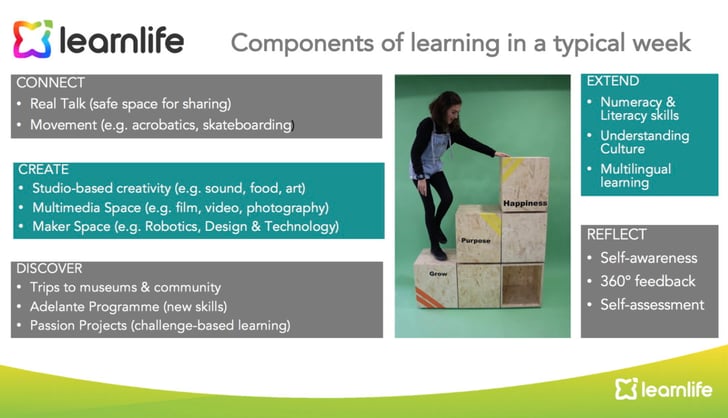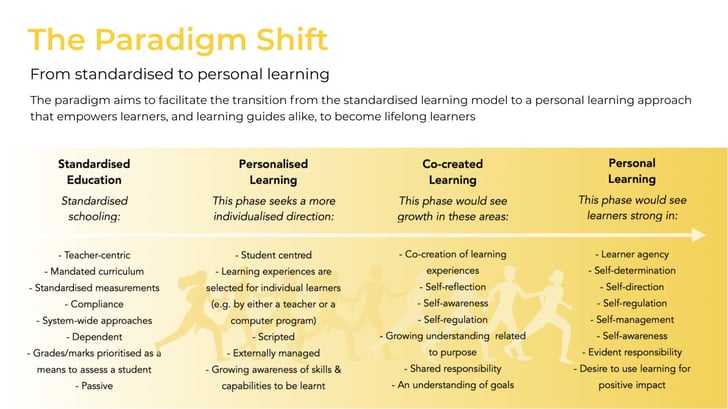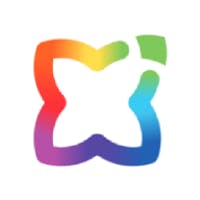In a recent post, Starting from Scratch, I looked at the pragmatics of envisioning new ways of creating learner schedules at the Learnlife Urban programme, far removed from traditional timetabling approaches.

Figure 1 Learnlife Urban programme weekly components
The driving force behind such thinking has multiple dimensions. First, the ambition is to grow self-determined learning capabilities (heutagogy). This is part of the process to developing lifelong learning habits through highly individual personal learning programmes.

Figure 2 The goal: a paradigm shift
Another dimension is to increase the ability to adopt authentic transdisciplinary approaches into the building blocks used to structure individual or collective schedules. Another highly important dimension is to break down any baggage the learners may have brought with them by co-creating schedules unlike any negative ‘schooling’ they may have previously experienced.
This thinking has been used to create strong foundations for fresh approaches at the Learnlife Nature programme. This programme supports the learning of 6 - 11 year-old learners, located at the Nature Hub, on the outskirts of Barcelona. It is presented here as a further case study for thinking differently about scheduling learning experiences unlike the more traditional discipline-based models used for centuries. The desired weekly components sparked a unique set of building blocks well suited to the geographic location and the intended pedagogic emphasis on nature-based learning.
Figure 3 Nature-based learning
The Nature programme at Learnlife started in September 2020, during the pandemic, with the intention of maximising learning opportunities for younger learners, in local and immediately accessible natural environments.
Thinking around creating a weekly schedule focused on a core of key competencies that were relevant to this age group, especially in the context of learning in nature. The starting point for the selected competencies was by adopting aspects of the Australian curriculum for younger learners, providing a solid basis upon which to innovate. This has been further strengthened by aligning thinking with the Catalan curriculum in specific areas such as numeracy. The competencies fell into five key domains and these were used to provide a holistic experience for the learners.
Figure 4 Competencies
These included:
- Learning to be
- Learning to think
- Learning to relate
- Learning to do
- Learning to live in the world
Learning to be included a focus on growing personal capabilities, as well as strengthening physical and mental well-being. Learning to think covered areas such as ethical thinking, along with critical and creative thinking skills. Learning to relate covered literacy, social capabilities and multilingualism. In learning to do, the focus is on creating and making, and as often as possible learning outdoors. The final category, learning to live in the world, focuses on intercultural understandings, ICT capabilities, global citizenship and numeracy. By starting with competencies, the learning experiences would intentionally place the acquisition of skills as a key goal, skills that in time could grow into self-directed and self-determined lifelong learning as a core capability.
Building blocks
The next step was to consider what might be relevant building blocks that could frame the different activities that the learners would experience. Drawing from the experience of the Urban programme and an understanding of the foundational place of relationship in effective learning, it was recognised that regular real talk blocks should be written into weekly schedules.
Figure 5 Nature programme Building Blocks
After this, it was a question of creating building blocks that would enable a consistent focus on all selected key competencies. Core concept labs (CCLs) provided the ‘parachute’ to ensure that the differing learning needs of learners coming from different cultural, linguistic and educational backgrounds could be well met. It includes a specific focus on building literacy and numeracy skills.
As seen in Figure 5, the remaining building blocks allow for deep engagement with nature, specific focus on gardening, and plenty of time for experiences connected to understanding local, regional and global cultures. Reading was included as a regular feature - not just because of its immediate appeal, but also helping immerse the learners in the three core languages – English, Spanish and Catalan. The role of collective gatherings was understood and a weekly community meeting was written into the recurrent schedules for all. Explore! Is a great doorway into enabling discovery and curiosity to drive the individual passions.
To bring the nature programme vision to reality, it required a complete rethink of how the children experienced their learning activities every day. The starting building blocks work well for now, but the Learnlife agile mindset means that the different components will be up for regular review, as they should be. And as the learners gain confidence in their own learning, the ambition is for learners to start co-creating their schedules – a critical step in growing lifelong learning capabilities.
As a society, we will not prepare new generations to become the creative problem solvers, capable of tackling the world’s larger issues, if we fail to think differently about the way we enable deep learning. The time to change is now – and the challenge is to be confident in our ability to think creatively around how deep learning might be best unleashed. The way we use time is the key to all this.
Dr Stephen Harris
Chief Learning Officer, Learnlife
Written by


